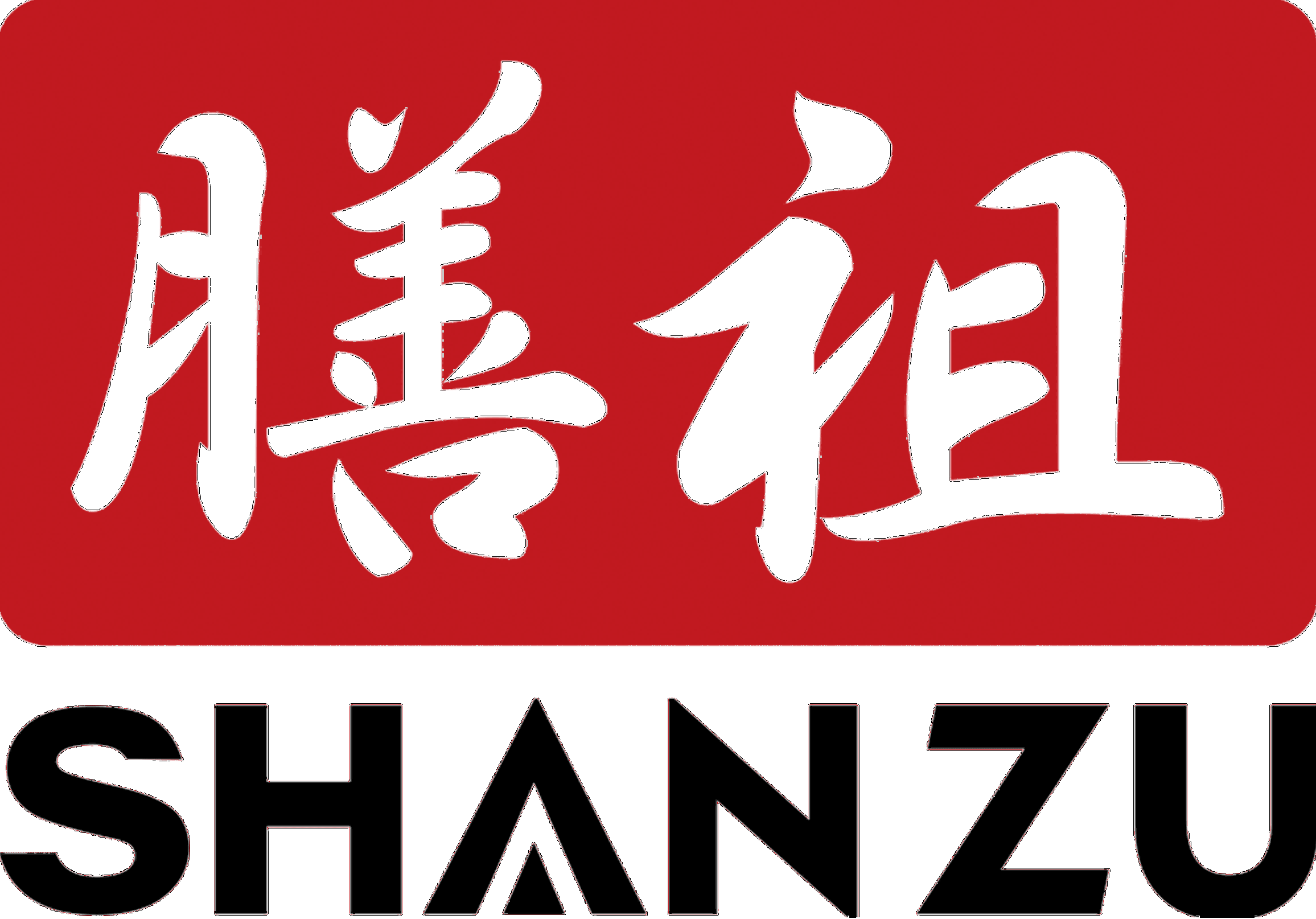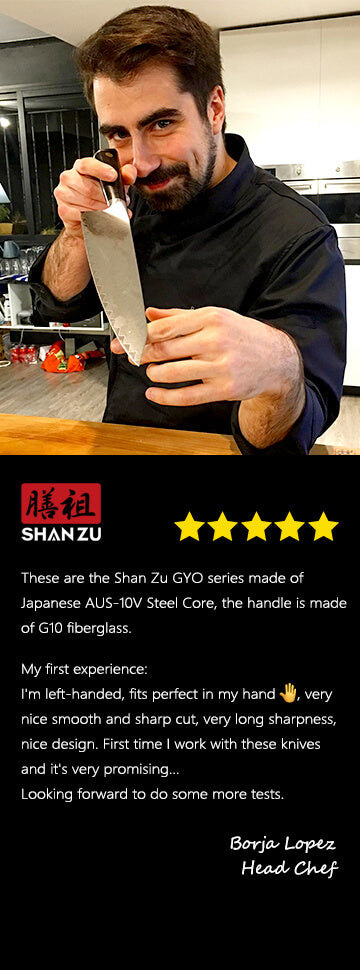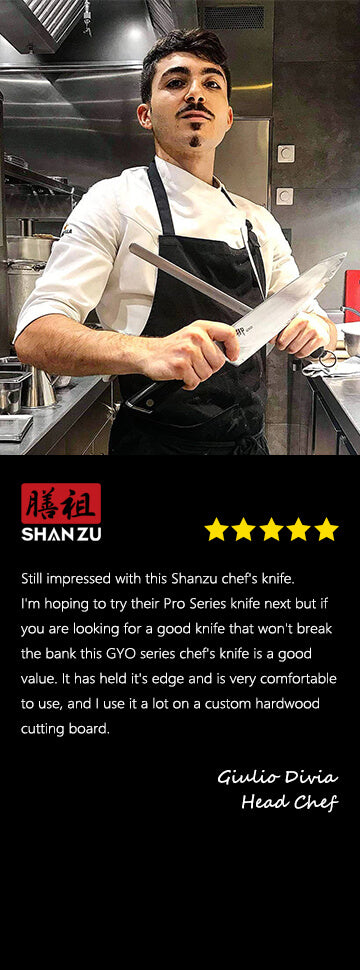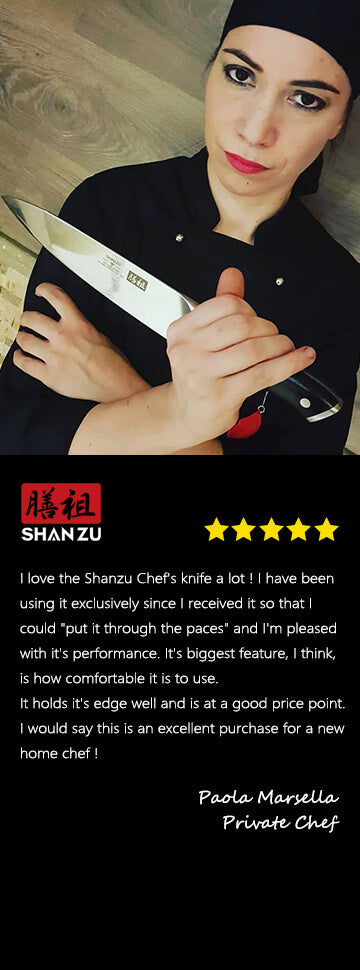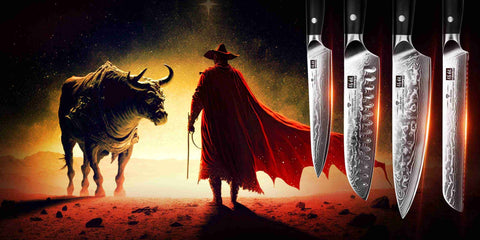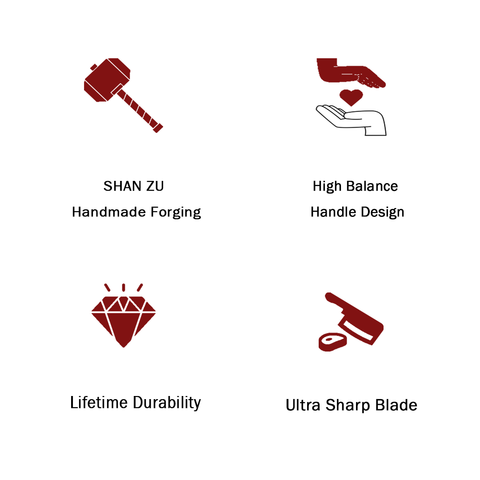L'avis de Nos Chefs Pros
Ne nous croyez pas sur parole, lisez ces témoignages!
Rejoignez le club exclusif SHAN ZU!
Couteaux de Damas SHAN ZU PRO
Libérez le torero qui sommeille en vous à chaque tranche; audacieux, téméraire et indompté comme une tempête dans le désert.
Ce qui vous tient le plus à cœur
Livraison standard gratuite pour toute commande. Couteau de cuisine SHAN ZU en vente dans le monde entier.
*Les régions suivantes sont exclues : Royaume-Uni, Irlande, Australie, Canada, Afrique, Moyen-Orient.
Couteau de cuisine SHAN ZU en vente dans le monde entier.
*Les régions suivantes sont exclues : Royaume-Uni, Irlande, Australie, Canada, Afrique, Moyen-Orient.
Le délai de livraison dépend de la destination. En général, il faut compter entre 3 et 14 jours. L'expédition internationale est possible dans la plupart des pays. Si nous ne pouvons pas livrer dans votre pays, nous vous contacterons. En outre, nous vous informerons de votre commande en vous envoyant une "confirmation de commande" et une "notification d'expédition" après avoir passé votre commande.
Les retours sont acceptés pendant 30 jours à compter de la date de livraison, conformément à notre politique de remboursement. Il vous suffit de nous envoyer un e-mail et nous vous indiquerons la marche à suivre.
Courriel officiel de SHANZU : shanzu@shanzuchef.com
Pour nettoyer et entretenir votre couteau, il est préférable de suivre les étapes suivantes:Tout d'abord, nettoyez la lame avec de l'eau chaude et du savon à vaisselle. Veillez à bien rincer et sécher la lame pour éviter qu'elle ne rouille.Ensuite, utilisez un fusil à aiguiser pour affûter la lame.
Ensuite, utilisez un fusil à aiguiser pour affûter la lame. Cela permettra de conserver le tranchant et de s'assurer que le couteau est en bon état de marche.
Si la lame est très sale ou si des aliments sont restés collés, vous pouvez utiliser une brosse à poils doux pour la nettoyer délicatement. Après avoir nettoyé et aiguisé la lame, appliquez une fine couche d'huile sur la lame et le manche. Après avoir nettoyé et aiguisé la lame, appliquez une fine couche d'huile sur la lame et le manche, afin d'éviter la rouille et de maintenir le couteau en bon état.Enfin, rangez le couteau dans un endroit sûr et sec, à l'abri de la chaleur et de l'humidité. Enfin, rangez le couteau dans un endroit sûr et sec, à l'abri de la chaleur et de l'humidité. Un bloc à couteaux ou un organisateur de tiroirs à couteaux est une bonne option, car il protégera la lame et évitera les accidents.
Pour aiguiser un couteau, vous aurez besoin d'une pierre à aiguiser SHANZU ou d'un aiguiseur de couteau. Pour utiliser une pierre à aiguiser, trempez d'abord la pierre dans l'eau pendant environ 10 minutes. Ensuite, posez le couteau à plat sur la pierre et inclinez la lame de manière à ce qu'elle forme un angle de 10 à 15 degrés avec la pierre. En effectuant des mouvements longs et réguliers, déplacez la lame sur la pierre dans un mouvement de va-et-vient, en veillant à maintenir l'angle de la lame. Après quelques coups, déplacez la lame de l'autre côté de la pierre et répétez le processus. Vous devez aiguiser la lame sur toute sa longueur et il vous faudra peut-être répéter l'opération plusieurs fois pour obtenir le niveau d'aiguisage souhaité.
Qu'est-ce que l'acier de Damas?
L'origine du nom "acier de Damas" est controversée : deux érudits islamiques, Al-Kindi et Al-Biruni (vers 800-873 de notre ère), ont tous deux écrit sur les épées et les aciers pour épées en se basant sur l'apparence, la situation géographique de l'endroit où elles ont été produites ou forgées, ou le nom du forgeron. Les deux auteurs mentionnent également les termes "damscene" ou "damascus" lorsqu'ils décrivent les épées dans une certaine mesure.
Sur la base de ces références, il existe trois sources possibles d'où provient le terme "Damas" dans le contexte de l'acier:
Al-Kindi qualifie de "damascènes" les épées forgées à Damas en Sibérie, mais il est important de noter que ces épées ne sont pas décrites comme ayant un aspect ondulé à la surface de l'acier.Al-Biruni fait référence à un forgeron d'épées appelé Damasqui qui fabriquait des épées en acier à creuset.En arabe, le mot "damas" signifie "arrosé", et les lames de Damas sont souvent décrites comme ayant un motif d'eau à leur surface.
L'explication la plus courante est que l'acier porte le nom de la capitale de la Syrie, Damas, la plus grande des villes de l'ancien Levant. L'explication la plus courante est que l'acier porte le nom de la capitale de la Syrie, Damas, la plus grande ville de l'ancien Levant. Il peut s'agir d'épées fabriquées ou vendues directement à Damas, ou simplement de l'aspect des motifs typiques, par comparaison avec les tissus damassés, qui portent également le nom de Damas.
Qu'est-ce que l'acier allemand?
Les couteaux allemands sont généralement fabriqués en acier inoxydable, dont l'indice Rockwell est compris entre 56 et 58. L'acier inoxydable contient du chrome. C'est ce qui abaisse l'indice de Rockwell. L'avantage est que la lame du couteau résiste à la corrosion et à la rouille.
Les cuisiniers s'accordent généralement à dire que les lames de couteau en acier inoxydable de type allemand sont plus résistantes que les lames de type japonais. Les cuisiniers s'accordent généralement à dire que les lames de couteaux en acier inoxydable de type allemand sont plus résistantes que les lames de type japonais. Sa durabilité vous permet de l'utiliser pour davantage de tâches de coupe et de hachage.
La caractéristique plus douce de l'acier permet toujours d'obtenir un bord tranchant, mais l'acier inoxydable vous obligera à l'affûter et à le tailler plus souvent. L'acier plus doux facilite également l'aiguisage de la lame, même si une lame en acier inoxydable signifie qu'un couteau allemand perdra son tranchant plus rapidement que son homologue japonais, qui est fait d'acier à haute teneur en carbone.
